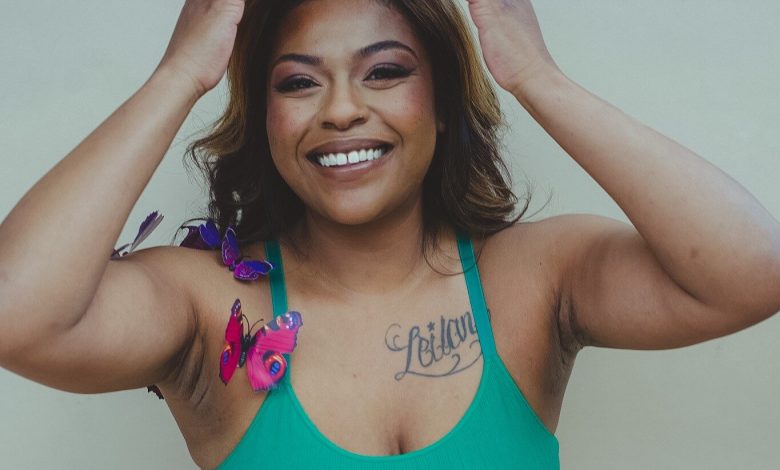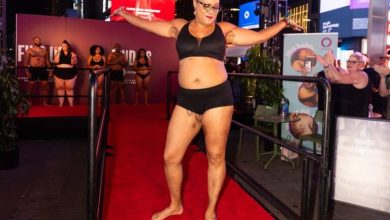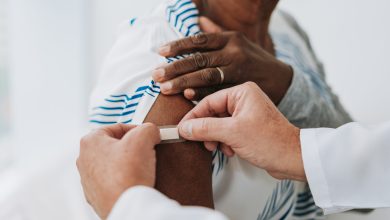Living with HS: ‘You’re So Much More Than the Scars’


To the average eye, hidradenitis suppurativa (HS) may look like a pimple or cyst. However, to the approximately 3.3 million people living with HS in the United States, the condition is far more serious, presenting itself during puberty with extremely painful, pus-filled lumps deep within the skin – typically found in the armpits, groin and butt area.
Although the disease can affect anyone, women are more than twice as likely to have the condition – and Black people are three times as likely to have the condition. Despite this, many people live with the condition for several years before receiving a proper diagnosis. The average time from symptom onset to HS diagnosis is 10 years with more than three misdiagnoses along the way.
Social media influencer and mother of four, Cydney Carter is one of those people.
She first began experiencing symptoms of hidradenitis suppurativa around the age of 11 or 12. It started with bumps on her inner thighs. At that time, neither she nor her mother knew what it was. They tried various home remedies, but the condition quickly spread. It wasn’t until Carter was in high school that she received an official diagnosis.
“It was quite the gap. When I finally did get diagnosed, I remember feeling like it was a bittersweet moment. It was nice to have a name for what I was going through, but it was also like, ‘Okay, there aren’t very many treatment options, there’s no cure, and this is something I have to deal with for the rest of my life,’” Carter shares.
The diagnosis brought a mix of emotions. Carter’s teenage years, already challenging, were further complicated by the condition leaving her feeling ashamed and embarrassed.

“I kind of spiraled negatively after getting my diagnosis. I always tell people that you should grieve your diagnosis when you finally get diagnosed with HS because it’s a lot of information coming at you, or lack thereof, depending on when you were diagnosed,” she adds.
Carter was also living in secrecy, which led to other negative behaviors and feelings of low self-worth.
“I didn’t talk about it. I didn’t tell any of my friends about it; I kept it to myself. It was literally, as they used to say, my dirty little secret because I felt like I had HS maybe because I was dirty or not washing properly, or I thought it was something I was doing wrong. So, of course, I didn’t feel comfortable sharing that with other people. So many things tied into the bottom line, which was that my HS was the problem,” Carter says. “For so long, I was lying to people and making up excuses as to why I couldn’t show up the way they deserved, but they didn’t know what I was going through.”
Carter’s perspective began to shift when she started sharing her story.
“When I started sharing my story, I just wanted to stop feeling like I was living in hiding,” she shares adding that she first began sharing her story on social media by sharing weight loss programs.

She began using platforms TikTok and Instagram to candidly share her journey and daily struggles of living with HS to prevent others from going through the same experience.
“Now, having the kind of energy that I have and having more self-worth, knowing that my worth doesn’t lie in what the scars are like on my body and what HS has done to me, but in who I am on the inside, that’s all I want to project out into the world. You’re so much more than the scars and the pain and the draining. We are actually pretty amazing individuals, and I just encourage people to not be so surface level, to dig a little bit deeper, figure out who they really are, and love themselves,” Carter adds.
Sharing her journey on social media has also allowed her to connect with others facing similar struggles. The response was overwhelmingly positive.
“Sharing my story on TikTok felt like I was allowing myself and others to know the real me. To my surprise, I was blown away by the response on social media and how much grace people gave me. There’s more good than bad in my comment section, which shows how many people have HS and have been dealing with it in secret for so long. It turned out to be something so much bigger than myself, and I’m thankful to God every single day because what a blessing for other people to know that they’re not alone.
Carter also prioritizes her skincare and flare care, which she calls a form of self-love.
“For a long time, I was ignoring my HS, which would ruin clothes, vibes, and just about everything. So now, I don’t ignore it. I actually wake up and prioritize my skincare and my flare care. That’s a form of self-love for me because when you act like it doesn’t exist for a long time and then prioritize it, it feels really good,” she shares.
“That’s a huge part of what I document on social media, showing others that it’s okay to have a 20-step skincare routine because we have to treat our whole body, not just our face. It’s okay that stuff costs a little bit more for us because we have to make sure we’re using great quality products, not just things that make us smell good.”
As a mother of four, Carter also emphasizes the importance of giving herself grace and communicating openly with her family. She highlights the importance of a strong support system.

“Balancing parenting with managing HS is challenging. I try to give myself grace and realize that some days won’t look the same, and that’s okay. Sometimes, all I have to give is 40 percent, and that’s still okay. I explain to my kids when I don’t feel well and do what I can with them when I can. When I can’t, I explain why,” Carter notes. “Having open communication with them and talking to them on a level they understand has been really great. I also communicate with my partner, letting him know when I can’t do something and giving him the chance to pick up what I can’t. Communication is key when it comes to raising and growing a family and being the head of the household.”
HS can also change the outlook of a woman’s pregnancy. For Carter, who recently welcomed her fourth child Naomi in April, each of her pregnancies has been different in terms of how HS affected her.
“I think each pregnancy has been different for me. Before, everything was about getting excited about being pregnant and having HS. Even giving birth, I was concerned about people seeing my scars and things like that. Now, I still have that underlying fear, but during my third pregnancy, I developed a pilonidal cyst, which is like HS’s twisted cousin,” she adds. “Even that flare alone impacted the way my fourth pregnancy went. We opted for a home birth instead of a hospital birth because I’d rather be comfortable at home.”
This decision was also an opportunity for Carter to educate the facility on HS, showing that it’s more common than not. “Women who have HS may experience anxiety about cervical checks or showing their scars. It’s been an educational journey for me,” she shares.

Carter is now partnering with UCB on its ‘Make HStory’ campaign, which has been a significant step toward raising awareness about HS.
“The inclusivity behind the campaign is what really motivates me. Not only are people going to see people of color with HS, white people with HS, men, women, but also having that call to action behind the campaign. If you think that you’re struggling or dealing with HS, here’s a next step. I think that’s what a lot of campaigns are missing. A lot of people don’t know what to do when they think that they have HS. So, I think the ‘Make HStory’ campaign is going to fill in a lot of blanks. Hopefully, we’re going to see the numbers go up because, as we said, we know a lot of people are dealing with HS, but we’re not talking about it. We really just wanted to start the conversation, and I think UCB nailed it right on the head,” she adds.
In the end, Carter hopes her story will encourage others to start talking about their own experiences with HS.
“That’s the homework that I give to anybody who I talk to who has HS, whether it’s online or in real life. Start sparking that conversation with your spouse, with your partner, with your mom, with a friend, with your doctor. The more you can have that conversation, the easier it will come, and the more people will know that they’re not alone,” she concludes.




